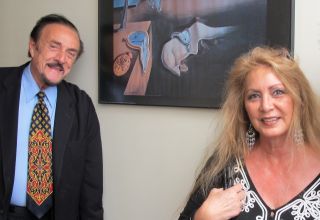Phil Zimbardo at TedX, Roma.
Source: Phil Zimbardo
For nearly 20 years it’s been my honor and privilege to be a colleague, writing partner, and most importantly, a friend of Phil Zimbardo. Back in the beginning of our fellowship, along with my husband, Richard Sword, we co-developed time perspective therapy (TPT), which is based on Phil’s groundbreaking time perspective theory. TPT was initially developed to help our clients suffering from post-traumatic stress (PTS), many of them veterans of war.
Post-traumatic stress consists of three things: a traumatic event that leaves you feeling depressed and anxious for an extended length of time. Because TPT helps with the combination symptoms of PTS it also works for people experiencing any one of the symptoms. The fruits of our labor were published in our book The Time Cure: Overcoming PTSD with the New Psychology of Time Perspective Therapy (2012).
Rick, Phil, and I had a warm relationship. Throughout the years we had stayed at each other’s homes, traveled together, and had some thrilling adventures, like the time Phil Zip-lined down the slopes of Haleakala with us. He was in his mid-seventies at the time. Another when he and Rick went on a harrowing helicopter ride through the West Maui mountains and beyond.

Phil Zimbardo & Rick Sword, Kahului, Maui.
Source: Rose Sword
Sadly, in mid-2014, these times came to an end. Less than two years after the release of The Time Cure, Rick passed away from gastric cancer. Knowing that I was devastated at the loss of my life companion, clinic workmate, and writing partner, Phil encouraged me to continue with the TPT manuscript we had started working on during Rick’s illness. After years of fits and starts, that book, Living & Loving Better, was published in 2017. It’s based on our PsychologyToday columns and the insightful comments we received from readers.
Although we wanted to write a Living & Loving Better, Part 2, we ended up writing something very different: what we referred to as “the grief book.” We took our time as we were busy with other TPT projects. The first involved developing apps for PTS and for grief and loss. The second was with Forum Media Polska, one of the largest professional publishers in Poland. It produces print and online media, continuing education courses, and other services. We conducted several online TPT courses and trained hundreds of Polish mental-health professionals intent on learning ways to help their citizens as well as the unexpected influx of refugees escaping Ukraine following Russia’s invasion. The third project we started was with Daria Buchinska, Natalia Khandobina, and Olha Datsko of Edges, a Ukrainian non-profit. These women and their team assist their fellow Ukrainians with their knowledge of mental health. In our last Zoom meeting, when I spoke of the grief book we were working on, Natalia grew excited. She shared that soldiers, veterans, and civilians who have suffered during the invasion, as well as hospitals and institutions, needed to learn how to cope with PTS and the intense grief and loss they continue to experience.
Then, in December 2023, Phil told me that he was terminally ill and our top priority became completing the grief manuscript. In April 2024, our third TPT book, Seeing Through the Grief: A Time Perspective Therapy Approach, was published. As we state in the book’s introduction, we felt it important to share what we had learned over the years about grief and loss, including some of our personal experiences, and also “teach our children how to grieve for us when the time comes.”
In between our first and last TPT books, we co-authored or contributed to nine other books, as well as nearly 150 PsychologyToday posts and numerous articles for other publications.
The Stanford Prison Experiment
I would be remiss when writing about Phil if I omitted his seminal—albeit infamous—work: the Stanford Prison Experiment (SPE), conducted in August 1971. We have written about it in this column before. To sum it up, the SPE demonstrated that the abusive behavior displayed by students acting as prison guards toward their fellow students portraying prisoners was caused by the simulated prison situation created in the study, rather than their individual personality traits.
Phil delivered a statement in late 1971 to the US House Committee on the Judiciary about his findings. A positive result of the study was that it altered the way prisons are managed in the United States. For instance, young people below the age of 18 accused of federal crimes are no longer housed before trial with adult prisoners due to the risk of violence against them. The SPE was also instrumental in changing how people are treated during psychological research. It is taught in psychology classes and a mainstream movie about the experiment was released in 2015: The Stanford Prison Experiment.
This research drove Phil to extensively pursue the question: Why do good people do evil things? After three decades of research, his findings were published in The Lucifer Effect: Understanding How Good People Turn Evil (2007). But it also caused him to research three new topics that hadn’t previously been studied:
Psychology Essential Reads
Heroism: Why, in difficult situations, some people heroically step forward to help others, oftentimes complete strangers, while others stand by and watch (the bystander effect.)
Time Perspective: The psychological time warp experienced by participants of the SPE—not knowing if it was day or night or what day it was—led to Phil’s research on people’s individual time perspectives, how these affect our lives, and eventually, to time perspective therapy.
Shyness: Rethinking shyness as a self-imposed psychological prison led him to conduct research on shyness in adults, and then create a clinic designed to address shyness.
Why the recap of our work
On Monday, October 14, 2024, at the age of 91, my dear friend Phil peacefully passed away surrounded by his loving wife Christina Maslach—a giant in the field of psychology in her own right—and their children at his home in San Francisco. With a very heavy heart, this last remaining TPT Mohican is viewing life through a different lens; a sadder one. And yet, it brings me great pride to share that the final book Phil and I contributed to was released on September 27, 2024 and is titled The More Dangerous Case of Donald Trump: 40 Psychiatrists and Mental Health Experts Warn Anew. While in hospice care, Phil signed a letter detailing how dangerous the 45th president was and will be again if he wins this coming presidential election. The letter is part of an ad that will appear in The New York Times later this month.

Phil Zimbardo & Rose Sword, Coimbra, Portugal.
Source: Rose Sword
This will be our last column. Without my mentor and guide, Phil, it’s time to move on. I’ll continue writing, but it will be fiction. After decades of researching and often reporting about the darker aspects of human nature, writing about other things will be a welcome change. It has been an honor writing for PsychologyToday and working with the fine editorial staff.
To my buddy, Phil, the fondest aloha ‘oe: Until we meet again.
— Rose Sword
Source link : https://www.psychologytoday.com/za/blog/the-time-cure/202410/the-time-cure-taking-our-leave
Author :
Publish date : 2024-10-17 17:54:54
Copyright for syndicated content belongs to the linked Source.





